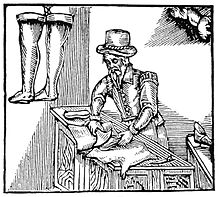Gonçalo Anes Bandarra
Gonçalo Anes Bandarra (* around 1500 in Trancoso , Guarda district , Portugal ; † 1556 in Trancoso) was a Portuguese poet, prophet and shoemaker in Trancoso . He was also called the "Portuguese Nostradamus ".
life and work
Bandarra worked as a shoemaker in the small village of Trancoso. He has been writing verse since his youth. Between 1530 and 1540 manuscripts appeared in which his verses were written, at the same time the verses were wisdom and predictions, prophecies about future events that affected Portugal and - as we now know - came exactly as he had foretold them.
With his prophecies inspired in the Old Testament, he had particular success among the New Christians (converted Jews), although apparently he did not belong to this group himself. His verses earned him a summons before the Holy Office of the Inquisition in Lisbon in 1541 . There he was condemned, his verses were forbidden and he was no longer allowed to publicly proclaim his idiosyncratic interpretations of the Bible. Various manuscripts of the verses passed through the population and were forwarded by hand. The book became a kind of national Bible of Portugal alongside the Lusiaden des Camões . A translation into German has not yet taken place.
The prophecies
The rhyming verses, divided into stanzas, first appeared in print in 1603 in Paris . Dom João de Castro, a little known man, published this under the title Paraphrase et concordancia de alguas prophecias de Bandarra, capateria de Trancoso, por Ioam de Castro, 1603 . They were reprinted in Nantes in 1644, in Barcelona in 1809, and in London in 1815 .
The verses spoke of a "longed-for" Portuguese king who would come to an end in Morocco and die young. In addition, Portugal will be occupied by Castile for a long time until a king comes and liberates the country. Bandarra always calls the Savior King only “the longed for” ( O Desejado ) or “the veiled” ( O Encuberto ). His prophecies were related in the later 16th century to King Sebastian , the most unusual king Portugal ever had. He was the son of the actual heir to the throne and was born in 1554 - just two years before Bandarra's death - and only 24 years old, blue-eyed, blond-haired, impotent and eccentric. Even the king's name was tapped for religious meanings, as he was the first and only king in world history of this name and died as a martyr for the Catholic faith, like his patron saint, Saint Sebastian in antiquity. Bandarra had predicted everything exactly the same. He also predicted the devastating defeat at the Battle of Alcácer-Quibir .
Readers in the 17th century believed that the "veiled" one was the prophesied of King Dom João IV , who in 1640 unexpectedly ended the personal union with Spain and brought Portugal back to its old independence. These predictions also agreed.
The prophecies had a major impact on the spiritual life of Portugal: they are considered the founding theory of Sebastianism , a messianic idea according to which King Sebastian would return when Portugal was in great danger. The influence was also extended to António Vieira , the great thinker and humanist of Portugal in the 17th century, who, through the verses , proclaimed the idea of the so-called " Fifth Empire " which he viewed Portugal as. Whenever Portugal seemed in any danger, for example after the earthquake in 1755 , the invasion of Napolean troops in 1809, the danger of being drawn into the Second World War (from 1940) or even during the financial crisis (from around 2008) experienced the verses and books new editions.
Fernando Pessoa wrote a poem about Gonçalo Anes Bandarra that he published in his only volume of poetry, Mensagem . Pessoa referred to Bandarra and, like Vieira, assumed that Portugal would be the last, "Fifth Empire" at the end of time. Unlike Vieira, however, he did not speak of a politically, economically or geographically powerful empire, but as a religious and spiritual superpower. In fact, there are scientists today who ascribe the verses of Bandarra to speak of Portugal as one of the most important nations of Catholicism worldwide and also to have foreseen the importance of Portuguese literature at the end of the twentieth century (including many translations, Nobel Prize).
Trivia
Bandarra has remained the most important figure in his hometown Trancoso to this day. A memorial in front of the town hall and the naming of a school commemorate him in the city.
Bandarra is three years older than its French counterpart, Nostradamus.
Bandarra died two years after the birth of King Dom Sebastian, for many a proof of his chosenness.
Web links
- http://www.infopedia.pt/$goncalo-anes-bandarra
- http://www.vidaslusofonas.pt/bandarra.htm
- http://www.comunidade.sol.pt/blogs/321123a1/archive/2007/03/31
- http://www.astormentas.com/PT/biografia/Gon%C3A7alo
| personal data | |
|---|---|
| SURNAME | Bandarra, Gonçalo Anes |
| BRIEF DESCRIPTION | Portuguese shoemaker, poet and prophet |
| DATE OF BIRTH | around 1500 |
| PLACE OF BIRTH | Trancoso , Guarda District , Portugal |
| DATE OF DEATH | 1556 |
| Place of death | Trancoso , Guarda District , Portugal |


